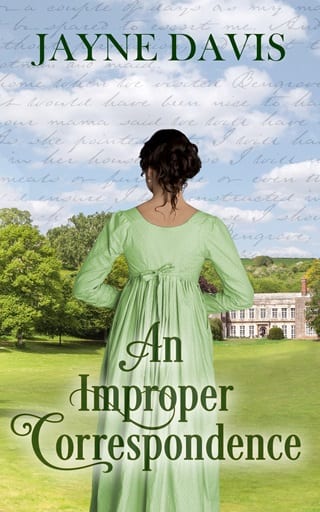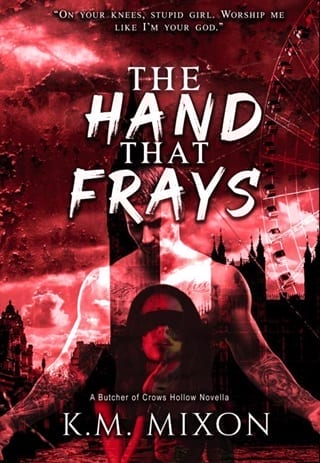Chapter 13
CHAPTER 13
V erdun, December 1813
In the weeks after his last letter to Miss Stretton, Rob wondered many times whether he had been right to say what he had about opium addiction. His doubts were not eased when he received a reply, for it was very brief, only thanking him for his kind wishes and for the information, which she had passed to her father.
Was that a final letter? He hoped not, for that would mean he had offended her, or her father. Or both. The note had come with another batch of Gazettes , although those had been sent by Mr Stretton's secretary. But the alternative explanation for the lack of Miss Stretton's usual entertaining communication was not something to be hoped for—that her mother had declined further, or even died.
That the latter might be true was indicated later in the week he came across Bengrove once again in their usual tavern, while he and Chadwick were waiting for Moorven to arrive. Bengrove was at the far side of the room, complaining about his future prospects to anyone who would listen, and clearly already in his cups. Unfortunately, he was talking so loudly that everyone in the room had no choice but to hear him .
"…wait until I get married. I'll sort everything out then."
"Thought you were complaining about that being delayed, Bengrove?" one of the players said.
"Not if I can help it. But the house is closed up, and the mother hasn't been seen out for weeks. Hope the old trout doesn't turn up her toes, or the family'll be in mourning."
"Being in mourning don't have to stop you getting married," someone pointed out.
"Oh, stow it, Bengrove. Just don't play if you can't pay!"
"I'll pay, I told you! As long as the woman doesn't play the jilt."
Rob started to listen more carefully. He wandered closer to Bengrove's table and leaned against the wall.
"Should have married her before I left, then I wouldn't be having these problems. Dragged her off to Gretna, maybe, or had my way with her and then her father would have had to get a special licence before I went back to Spain." Bengrove emptied the brandy glass he was holding.
"I say, Bengrove, that's a bit much," one of the other men around the table protested weakly. Rob bit his lip, muscles tense as he fought the inclination to dive over the table and shove Bengrove's teeth down his throat. But he knew he could not rush to Miss Stretton's defence without betraying their correspondence. That would not go down well with Bengrove—with good reason. Rob felt a pang of guilt, swiftly suppressed when he remembered that Bengrove had never mentioned her with respect, but always with some disparaging remark. If Miss Stretton's betrothed had been someone honourable, like Moorven, then Rob would not have continued with the correspondence. Indeed, he would never even have thought of writing to her.
There was a movement beside Rob, but he ignored it, still focused on Bengrove and the men around him.
"Why do you think she might jilt you?" someone else asked. "Not that I'd blame her."
"My brother says she's being squired about by a couple of youngsters," Bengrove said, seemingly oblivious to the insult. "My father tried to get her old man to sign the settlements a couple of times after I was captured, but he wouldn't. Damned cits, no sense of honour. If it weren't for the money, I'd not go near the woman."
Rob felt a hand on his shoulder, and looked around to see Moorven standing beside him.
"Let me deal with him," Moorven said.
Moorven didn't know about Rob's correspondence with Miss Stretton, but he must have seen his anger at Bengrove's words. With his rank and a cooler head, Moorven was in a better position to make Bengrove stop, so Rob nodded.
"Such touching devotion to your betrothed, Bengrove," Moorven said. "Such gentlemanly conduct, talking about a respectable woman like that behind her back! How did you manage to persuade the poor woman to become engaged to you?"
"Mind your own damned business, my lord ," Bengrove snarled. "This is nothing to do with you."
"It is to do with us , though." One of the card players spoke up as Bengrove refilled his glass and drank from it. "You're promising money you haven't got yet. What if she gets to hear about the way you talk about her? If the woman had any sense, she'd run a mile before tying herself to you. And then you'd have no chance of paying your debts."
"I told you—she wants to marry into a good family."
"A debt-ridden one," someone muttered. "Poor girl must be desperate."
"Who's to tell her, anyway?" Bengrove protested.
"Oh, perhaps I will," Moorven put in. "If she's as rich as you say, and desperate for improving herself, I dare say my title might swing the odds in my favour. Not to mention my future prospects."
"If Moorven doesn't, my old man's a baronet," someone called. "Not a viscount like yours, Bengrove, but I'm the eldest son!"
"You'll have to get rid of your own wife first, Johnny boy," another voice shouted, amidst laughter.
"Ah, well. It was a nice thought while it lasted!"
That brought another laugh from most of the listeners, who were now treating the whole conversation as a jest. Bengrove would have done well to leave it there, but he didn't. He stood up, staggering slightly, and walked over to where Moorven and Rob stood against the wall, breathing brandy fumes in their faces. "She's betrothed to me. " He poked Moorven in the chest. " You don't know who she is."
"I'm sure I could find out," Moorven replied quietly. "Even if Delafield here doesn't recall the address from the letters he wrote for you. I would be doing her a favour, I should think, to warn her off."
Bengrove turned a bleary eye on Rob. "You, you countrified oaf, should know your place and not interfere with your betters." Then back to Moorven. "And you can mind your own bloody business!" Bengrove drew his fist back and took a swing at him. Moorven, being sober, dodged it easily and Bengrove hit the wall behind him instead. He gave a howl of frustration and pain and bent over, moaning and clutching his damaged hand. Moorven gazed down at him for a moment, shrugged, and turned away.
"Fancy a different location, Delafield? Company's a bit below par in here."
Rob followed him out, pausing only to let Chadwick know they were leaving.
"Do you know his betrothed?" Moorven asked.
"In a way," Rob replied. He said nothing for a few minutes. He should not betray Miss Stretton's confidence, but his anger at Bengrove needed some explanation, and he trusted Moorven not to tell anyone else. He gave Moorven a brief outline of events. There was a long silence when he had finished.
"It seems Bengrove has some cause for annoyance, even if he doesn't know it," Moorven remarked at last.
"I'm not trying to… I mean, I've never met the young lady, how could I…?" Why had Moorven's question flustered him so much? "There has never been anything said—written—that was other than between friends."
"I doubt Bengrove would see it that way."
"I hope he'll never know," Rob said shortly, still uneasily aware that it really was not proper to correspond with a young woman who was in no way related to him.
"You are really just friends?"
Rob had asked himself that from time to time. How could they be anything more? Liking someone to any degree beyond ordinary friendship based purely on what they wrote in letters was foolish—wasn't it?
"In all fairness," Moorven went on, "I think someone should at least tell her father what Bengrove is like. If you don't feel that you can tell me, I'll find her name and direction somehow."
"I'll see her father when we get out of here," Rob said firmly. And he would. Never mind the idea that it wasn't the done thing to interfere in another man's marriage— future marriage—no-one deserved to be tied to Bengrove without at least being warned of what he was like. Bengrove had crossed a line tonight. The way he had disparaged her when he was talking to Rob was bad enough, but to do so in public went well beyond the pale.
And if Miss Stretton took Bengrove anyway? Could she really want to have titled relatives so much that she would happily live with him? Surely not. Her letters… her letters showed she had a keen intellect and a dry sense of humour. How long would it take for Bengrove to wear all that out of her?
"More ale, Moorven?" Rob said abruptly. "I feel a sudden need to get drunk."
Bath, December 1813
Jo stayed with Aunt Sarah for three weeks. During that time she received daily notes from Papa that said she wasn't to worry. George continued to take her for walks on fine days, in spite of the frigid air, and she visited Catherine Bengrove several times. Then Papa came in person one morning and Jo was summoned to the parlour.
Jo felt a momentary dread, but yesterday's note had said nothing ominous, and she dismissed the feeling. Aunt Sarah was already in the parlour with a smile on her face. "Good news, my dear."
Her knees feeling suddenly weak, Jo sat down.
"It is good news, Jo," Papa said, coming to stand in front of her. "The last weeks have been very… unpleasant… for Frances, but she has been free of the worst effects of opium for three days now."
"Is she still…" Aunt Sarah hesitated. "I mean, Frances needed laudanum after losing the baby because of the pain she was feeling."
"She says there is no pain now. Doctor Saunders thinks it is possible the original damage has healed."
"Oh, Papa." Jo stood up, and her father enveloped her in a hug. "Oh, I am so glad!"
"It is not a cure, Jo." Papa held her away from him a little. "You must understand that. You, too, Sarah. She is likely to need to take a weak form of the tonic from time to time—she will never be entirely free of it, and the craving for more may come upon her again. Halsey and the other servants will have to be warned not to buy extra laudanum for her, even if she pleads for it. You, too, Jo."
"Yes, Papa."
"Sarah?"
Aunt Sarah sighed. "Of course. And I will be vigilant whenever she comes to Yelden Court. It will not be easy, I think, if she says she is in pain."
"You should talk to her yourself about this. She is more lucid and aware now than she has been for some time, although still weak from her lack of appetite these last months."
Jo thanked her aunt for letting her stay, and returned to Queen Square with her father. She found Mama lying on the chaise longue in the parlour, swathed in shawls, as usual. There were shadows beneath her eyes, and her face looked drawn. But she held a hand out when Jo entered, her smile happier than Jo had seen in many months. Jo ran over and knelt beside her, tears coming to her eyes.
"Now, don't cry, dear. All will be well, you'll see."
Jo sniffed, swallowed hard, and nodded.
"It will be some time before I am up and about properly again. You must promise me, Jo, to go about with your aunt as long as the Yeldens stay in Bath."
"I will, Mama." She might enjoy the assemblies and concerts more now she did not have the worry about Mama always in her mind.
Life settled into a new routine in the following weeks. Mama began to go to the Pump Room every few days, first with Papa, then with Jo and Aunt Sarah when Papa had to return to London. Snow curtailed many of their activities, but they went out when the streets had been cleared enough to be safe.
Jo made a point of attending as many concerts and recitals as she could, and went to the weekly assemblies. She even put up with Mama summoning a dressmaker to measure Jo for new evening gowns and walking dresses—an exercise that she normally disliked. The Bengroves returned to Staffordshire before Christmas, so she no longer had a particular friend to call on, but she found she did not miss Catherine as much as she'd expected to. Jo liked her well enough, but they had few mutual interests to talk about.
One afternoon, several weeks after Jo had returned from Aunt Sarah's, Jo sat at the table in the front parlour while Mama took her usual afternoon nap. She had finished with the latest batch of newspapers, and left one folded to show the invitation to invest in a new canal project that she wanted to discuss with Papa when he arrived from London later this evening—if the state of the roads permitted. Feeling somewhat at a loose end, she watched the street for a while, but the cold was keeping many people indoors and dusk was gathering. The novel she was reading from the circulating library didn't appeal to her at the moment. Instead, she opened her portable writing desk and took out the bundles of letters she kept there.
There were two, the smaller one containing Alfred's brief notes. She rarely looked at those more than once, for they were all remarkably similar, being limited variations on the theme of missing her and frustration at his continued incarceration. The ones from Captain Delafield made a much larger bundle. Since she had confided her fears for her mother in October, and then sent the good news of Mama being on the mend, their letters had become longer. Reading them and writing back felt like holding a conversation with a friend in whom she could confide her hopes and fears, albeit one with long gaps between exchanges. She flicked through them, reading the odd paragraph here and there: sympathy for her troubles, anecdotes of happenings on his walks about the city, comments on the progress of his studies, including admitting to struggling with some of the mathematics involved. And the all-important one with his thoughts about laudanum, for which she would be ever grateful.
She picked up his most recent letter.
The news of the continuing French retreat, and Wellington's victories in the south of France, is giving us hope that the Allies may soon succeed in ousting Bonaparte and we may all return home.
She wanted the war to end, of course she did, but then Alfred would return, and she would have to decide what to do. The Alfred in his letters was not the Alfred that she remembered meeting at Yelden. Perhaps it was just that he was not very good at putting his feelings into writing? She flicked through a few of his letters. If her memory of him were faulty and she had just been flattered by his attentions, could she really marry him? It wasn't just his letters that gave her doubts, but also the prospect of being part of the same family as his unlovely parents. She sighed—she had no choice but to wait and see what transpired when he came home.
Almost as if she had read her daughter's mind, Mama's voice made Jo look up. "Is that a new letter from Alfred, dear?"
"No, Mama. I am re-reading old ones."
"Read some to me, Jo. At least writing still keeps you two in touch."
Jo reached for Alfred's letters and then paused. She had read out the trite compliments too many times in the worrying days when Mama had not seemed to recall that she had heard the same things before. Mama had so set her heart on Jo's marriage to Alfred that Jo didn't want to voice her doubts yet. So she sorted through Captain Delafield's letters, finding one that included something that she could discuss with Mama. "Here's an interesting one, Mama," she said, unfolding one from last summer. "He writes that he has heard from his family that some wounded men from his company have gone there to ask for help. Then he says, ‘but when this war is over—whoever wins—there will be many more with little or no provision that I know of to help them earn a living once the army no longer needs them. '"
"That's very thoughtful of him, dear."
"Then he goes on, ‘ When I return, I would like to help any former soldiers who need it. Any form of assistance will require money, but no doubt funds could be raised with enough effort. But money is not the only requirement; there is also the problem of how to spend it wisely, and that is possibly the more difficult to solve.' "
"Soup kitchens," Mama suggested. "Several well-born ladies organise such things for the poor."
"That does not help people permanently, Mama."
"No, I suppose not. Does he have any ideas? Do read the rest."
"All right." It was good to see Mama taking a real interest again, after her forgetfulness and changeable moods while she had still been suffering the effects of the tonic. "He says, ‘ Wellington has referred to his soldiers in disparaging terms on several occasions, and I know of some men in my own regiment who will easily return to a criminal life, but others who started out that way have learned discipline and self-respect, and deserve a chance to earn their own living and not depend on charity—particularly the kind dealt out by the workhouses. '"
"That's a good point," Mama said. She lay back and Jo wondered if she'd fallen asleep again, until she spoke. "I suppose some could find work in the new factories. But most will not be skilled in anything other than fighting. The funds you spoke of could be used to train them for other occupations." Her gaze slid away from Jo towards the door. "Nathaniel!"
Jo spun around. "Papa! You are earlier than we expected. We did not hear you arrive. "
"I managed to get on an earlier coach, and you were engrossed in your letters." He looked at Mama, and his face softened. "How are you, Frances? You are looking well."
"I am feeling well." Mama sat up, swinging her legs to the floor, and Papa went to sit beside her. The look they shared made Jo feel very much de trop , so she crept out of the room. Would she have that degree of affection with Alfred when he returned?
 Fullepub
Fullepub 



